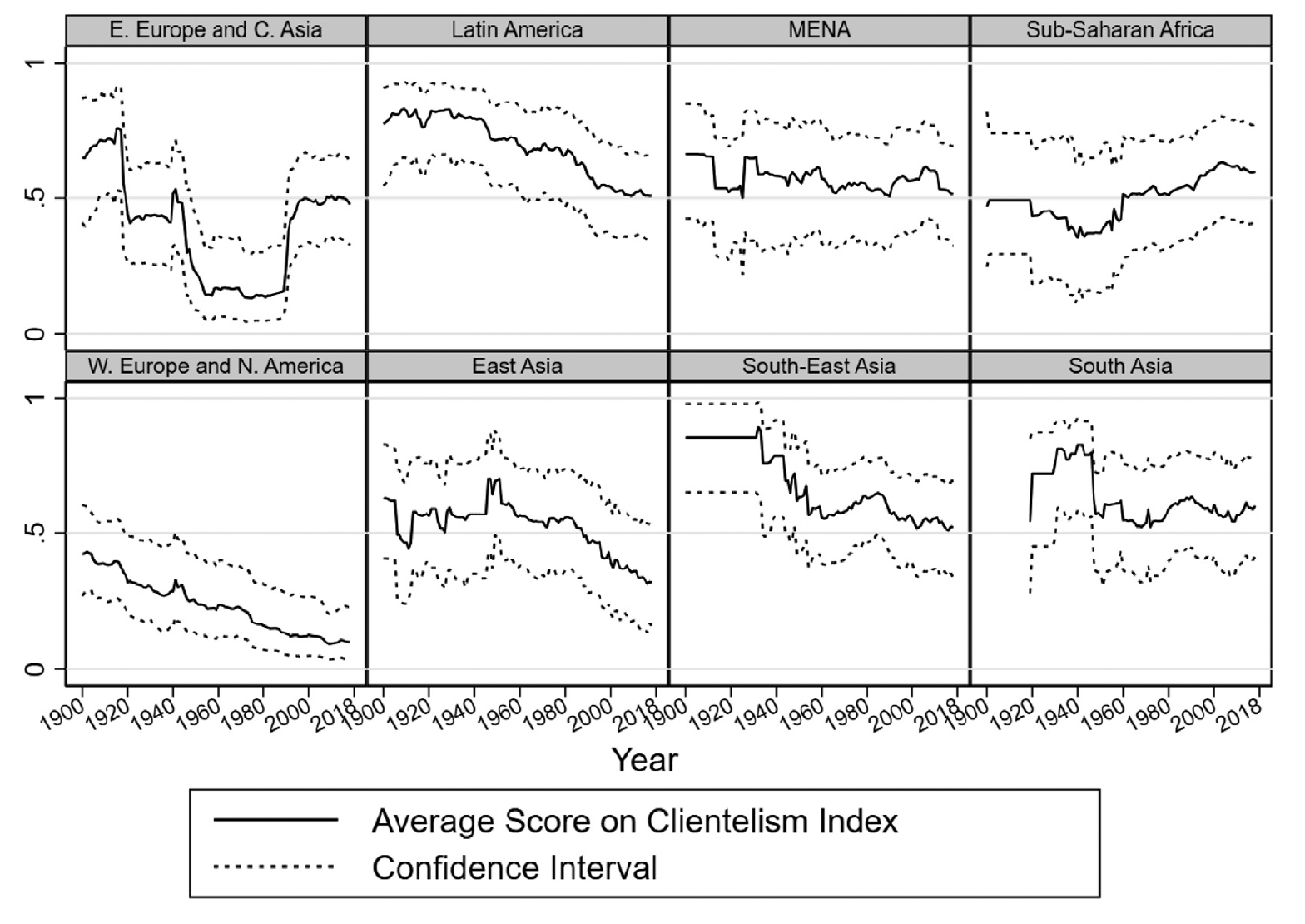Blog
Does political clientelism lead to higher corruption and a weaker rule of law?
Political clientelism is the strategic, discretionary, and targeted exchange of goods and services between politicians and voters for political support. In many low- and middle-income countries, clientelistic practices such as vote-buying and ‘machine politics’ are ubiquitous.
While clientelism is declining in some regions, it is increasing in sub-Saharan Africa, has made a surprising comeback in Europe and Central Asia, and remains at high levels in the Middle East and North Africa.
Figure 1: The evolution of clientelism around the world

Source: Author’s elaboration based on the V-Dem Dataset
It is well documented that clientelism may have short-term benefits for poorer citizens, who are more likely to be favoured by politicians as their votes are cheaper to buy. But there is less knowledge on the long-run effects of clientelism, particularly on how it affects the quality of governance, as measured by political corruption and the rule of law. Our recent study fills some of this gap.
Clientelistic countries have more corruption and a weaker rule of law
Using the Varieties of Democracy (V-Dem) dataset, we find that differences in governance quality, as proxied by corruption and rule of law, are explained by differences in political clientelism to a significant extent. Countries where clientelism is more pervasive tend to have higher levels of corruption and a weaker rule of law.
Furthermore, our study differentiates between two types of political clientelism which prevail across low- and middle-income countries. The first type is vote buying, which refers to the distribution of money or gifts to individuals, families, or small groups shortly before an election to influence their vote choice or turnout. This dimension of clientelism can be thought of as ‘one-shot’ clientelism, where politicians provide inducements to voters just prior to or during an election.
The second type is party linkages, which refer to the sort of goods that political parties offer—particularistic or programmatic—in exchange for political support, throughout their full term in power. This type of clientelism is often referred to as ‘relational’ clientelism.
To understand the effects of political clientelism on the rule of law and political corruption, we use a historical panel dataset which covers 134 countries from 1900–2018. This panel data allows for the study of the entire twentieth century for both (now) developed and developing countries. The dataset has consistent measures for political clientelism, political corruption, and the rule of law, which are comparable across countries and over time
Why should political clientelism lead to adverse governance outcomes?
First, political clientelism is expected to lead to corruption because politicians may seek illicit funds to finance vote-buying. They may also look to firms that will provide campaign funds in return for preferential access to government contracts or the bureaucracy. Second, political clientelism should be associated with weaker enforcement of property rights, because the selective enforcement of property rights can be a favour to political supporters.
How will vote buying and party linkages affect the two variables (corruption and the rule of law) differently? We argue that both forms of clientelism have a similar impact on the level of corruption, but that party linkages or relational clientelism has a much larger effect on the rule of law than vote buying does.
In the context of clientelism and corruption, politicians offer financial or material rewards to citizens with the expectation that they will provide political backing in return. Because one-shot clientelism and relational clientelism both entail an exchange between politicians/political parties and specific groups of voters, electoral advantages go to actors with the most resources. Corruption is often one avenue for political actors seeking to increase their available resources.
The impact on rule of law is through a different channel. The ongoing nature of relational clientelism can foster a general culture of impunity. It can also have a negative effect on the rule of law through the practice of forbearance, when governments intentionally refuse to prosecute violations of the law for specific groups of voters in exchange for political support. We expect relational clientelism to have a strong effect on the rule of law, but vote buying to have a weak effect.
Our empirical analysis of the VDEM data yields results that support this (see Table 1). In substantive terms, a one-unit difference in the clientelistic party linkages indicator (which corresponds to moving from a setting where constituents are systemically rewarded with goods, cash, or jobs to a setting where parties also offer local collective goods in exchange for political support) is associated with a statistically significant 4–5% increase in the impact on the rule of law.
Table 1: Estimated coefficients on the party linkages and vote-buying indicators across different model specifications
Party Linkages | Vote Buying | ||
Corruption | (a) | - 0.051*** (0.002) | - 0.032*** (0.002) |
| (b) | - 0.051*** (0.002) | - 0.031*** (0.002) | |
| (c) | - 0.052*** (0.003) | - 0.025*** (0.003) | |
Rule of Law | (a) | 0.055*** (0.002) | 0.020*** (0.003) |
| (b) | 0.044*** (0.002) | 0.023***(0.002) | |
| (c) | 0.049*** (0.003) | 0.016*** (0.002) | |
Notes: Prais-Winsten regression with heteroskedastic panels corrected standard errors reported in parentheses * p<0.1; ** p<0.05; *** p<0.01. Country and Year Fixed effects included. Model (a) is a parsimonious specification which includes the clientelism index or each of its two components along with the time and country dummies. Model (b) adds to this specification GDP per capita (in log), Democracy and Education as control variables. Model (C) further controls for trade openness, inequality (proxied by rural inequality) and civil war. The party linkages indicator is an interval measure on a scale from 0 (clientelistic) to 4 (policy/programmatic). Vote buying is measured as the prevalence of vote or turnout buying during each election year. The level of vote or turnout buying is an interval measure ranging from 0 (systemic vote or turnout buying) to 4 (no evidence of either occurring). Source: authors’ elaboration based on the V-Dem data set.
It is widely recognised that a defining feature of economic and political development is the move from non-programmatic to programmatic modes of public distribution of goods and services to citizens—in other words, when goods and services are delivered in an impersonal and rule-bound way. While there may be static redistributive benefits of political clientelism if particularistic benefits go mostly to the poor, we show that the long-run effects on governance quality are negative. This suggests that support for broader programmes is merited.
Furthermore, supply-side interventions such as programmatic social welfare programmes and media campaigns against vote buying may be needed to bring about an erosion of political clientelism in regions of the world where political clientelism is still prevalent.
Staffan I. Lindberg is the Director of the V-Dem Institute at University of Gothenburg and one of five Principal Investigators for Varieties of Democracy (V-Dem).
Maria Lo Bue is a former Research Associate at UNU-WIDER and Lecturer in the Department of Economics, Business, Mathematics and Statistics at the University of Trieste.
Kunal Sen is Director of UNU-WIDER and Professor of Development Economics at the Global Development Institute (GDI), University of Manchester.
The views expressed in this piece are those of the authors, and do not necessarily reflect the views of the Institute or the United Nations University, nor the programme/project donors.
 Join the network
Join the network





